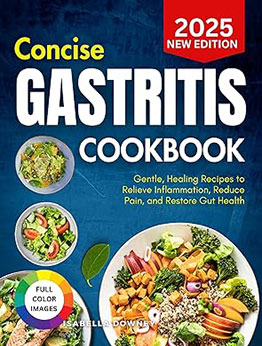![ULCER DIET COOKBOOK by ARNOLD KUNTZ PH.D [PDF: B08MXDLHPN]](https://cookebooks.info/wp-content/uploads/2022/01/B08MXDLHPN.jpg)
- Title: ULCER DIET COOKBOOK: PERFECT GUIDE TO STAY HEALTHY ON ULCER DIET. INCLUDING 50+ DELECTABLE RECIPES
- Author: ARNOLD KUNTZ PH.D
- Pages: 113
- Publisher (Publication Date): November 6, 2020
- Language: English
- ISBN-10, ISBN-13 or ASIN: B08MXDLHPN
- Download File Format:PDF
Gastritis is a digestive condition that involves inflammation of the stomach lining. Symptoms include indigestion, burning stomach pain, nausea, and frequent burping. For some people, dietary changes can help. There are different types and causes of gastritis. A common cause is infection with Helicobacter pylori (H. pylori) bacteria. Other causes include the use of nonsteroidal anti-inflammatory drugs (NSAIDs), a high consumption of alcohol, and some inflammatory diseases, such as Crohn’s disease.
Some foods may increase the risk of H. pylori infection, and certain dietary habits can trigger stomach lining erosion or otherwise worsen gastritis symptoms. A person with gastritis may find it difficult to eat, resulting in a loss of appetite and unwanted weight loss. Untreated gastritis can lead to ulcers, persistent pain, and bleeding. In some cases, it can become life-threatening. Chronic stomach inflammation also increases the risk of stomach cancer.
Ulcers are sores that can happen in your digestive tract, including your lower throat (oesophagus), stomach and intestines. Ulcers are usually caused by the bacteria Helicobacter pylori that many of us have in our bodies already. The symptoms can be made worse by your stomach acid. It is not entirely clear why ulcers start but stress and diet, especially a fatty diet, are big contributing factors. A higher intake of fat can greatly increase your chance of getting an ulcer in the first place and cause other gastrointestinal problems. High salt intake is also implicated.
![ANTI–CANCER SMOTHIES by ARNOLD KUNTZ PH.D [PDF: B08GKC3NQN] ANTI–CANCER SMOTHIES by ARNOLD KUNTZ PH.D](https://cookebooks.info/wp-content/uploads/2020/08/B08GKC3NQN.jpg)
![Gastritis Cookbook by Jerris Noah [EPUB: 1648640281] Gastritis Cookbook by Jerris Noah](https://cookebooks.info/wp-content/uploads/2020/11/1648640281.jpg)

![PERFECT PANINI COOKBOOK FOR BEGINNERS AND DUMMIES by ARNOLD KUNTZ PH.D [EPUB: B08PK1B7KB] PERFECT PANINI COOKBOOK FOR BEGINNERS AND DUMMIES by ARNOLD KUNTZ PH.D](https://cookebooks.info/wp-content/uploads/2020/12/B08PK1B7KB.jpg)
![Low Fodmap Diet by Brand S. Frith [EPUB: B083W7KDKP] Low Fodmap Diet by Brand S. Frith](https://cookebooks.info/wp-content/uploads/2020/01/B083W7KDKP.jpg)
![THE GASTRIC DIET COOKBOOK by Beauty Claire [EPUB: 9798374230161] THE GASTRIC DIET COOKBOOK by Beauty Claire [EPUB: 9798374230161]](https://cookebooks.info/wp-content/uploads/2023/01/9798374230161-170x261.jpg)